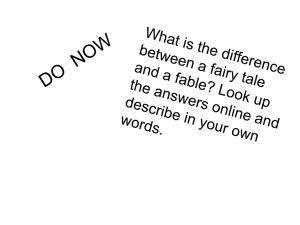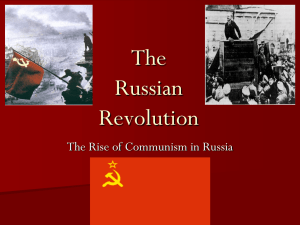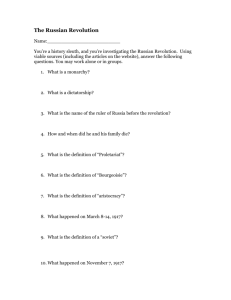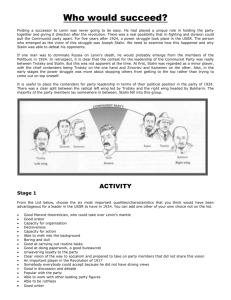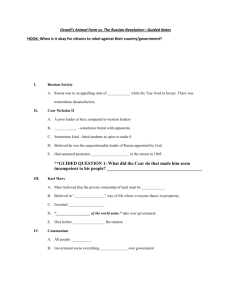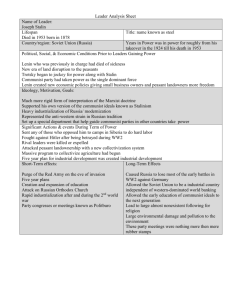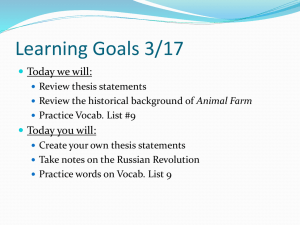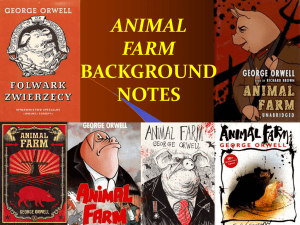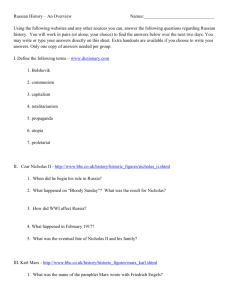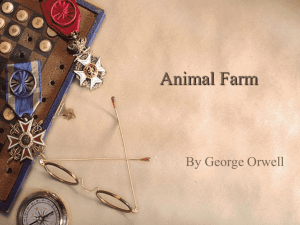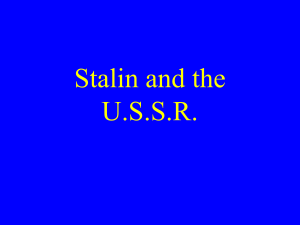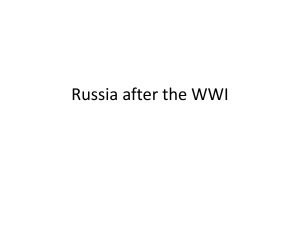Animal Farm Intro
advertisement
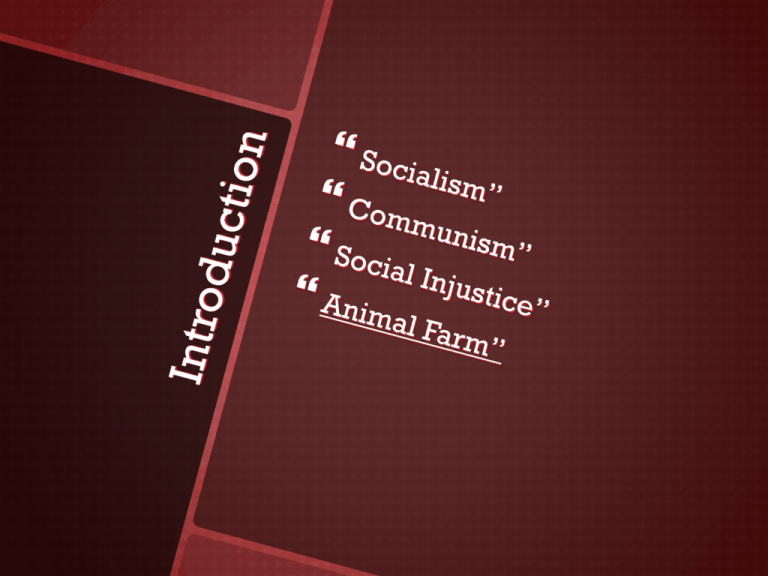
Monday October 29th List 3-5 things you learned about Joseph Stalin from the video. What do you think propaganda means? Is an ALLEGORY of the Russian Revolution Allegory: a literary work that has hidden meaning beneath the literal meaning of the story, poem, or play. • • Allegory usually relies heavily on symbolism to teach a lesson or explain an idea. The characters in an allegory often stand for abstract ideas or concepts. Dystopia: A very flawed world Utopia: A perfect world The Romanovs Small group of elite, wealthy people that controlled Russia for 300 years The economy was changing… • • Industrial Revolution • Food Shortages/Inflation • Years of Mistreatment of Lower Class Creation of the Middle Class 1. 2. 3. 4. Collective Ownership/Means of Production All People Are Equal “Religion is the Opiate of the Masses” The State Must Crumble/All Bourgeoisies are enemies 5. All people work to their own ability 1917- Czar Nicholas II was overthrown by THE Intelligencia and THE BOLSHEVIKS (Vladimir Ilych Lenin) All land was taken by the Government and given to Proletariats (working man) Every man, woman, and child worked for their own food and materials. The wealthy were either exiled or their wealth was taken and distributed back to the people. 1. THE SECRET POLICE: CHEKA 2. THE REDS vs THE WHITES • OPPOSED TO SUCH REVOLUTIONARY TACTICS • SOUGHT TO FREE THE CAPTIVE CZAR AND HIS FAMILY BEFORE THEY COULD BE FREED ALL wealthy should be killed at all costs. Secret police began attacking and killing the wealthy and all farmers that refused to hand over property COMMUNISTS vs. COMMUNIST INTERNATIONALE RUSSIA IN CIVIL WAR RED ARMY (COMMUNISTS)TROTSKY WHITE ARMY (TRADITIONALISTS) He was very concerned about creating a free universal health care system for all, the rights of women, and teaching the illiterate Russian people to read and write. INCREASES SECRET POLICE JOINS COMMUNIST INTERNATIONALE FIVE YEAR PLANS MODERNIZED BUT LOST LIVES BANNED ALL INTELLECTUAL/IDEALISM STARTED WORK CAMPS GULOG: PRISON CAMPS The Gulags STALIN WAS SO Paranoid HE… • FORCED PEOPLE TO CONFESS TO CRIMES • EXILED TROTSKY/OTHER LEADERS • • • • KILLED ALL ARMY GENERALS MYTHOLOGIZED HIMSELF CONTROLLED THE MEDIA FOLLOWERS BELIEVED HE WAS HELPING • Hitler AND STALIN ARE ALLIES • HITLER TURNS ON STALIN AND ATTACKS RUSSIA • • ENGLAND SENDS BACKUP STALIN DEFEATS GERMANY…with help of US and Britain Media designed to influence public opinion on a social or political issue, often by appealing to fear or prejudice • • • • Word Games False Connections Special Appeals Logical Fallacies Name calling: - links a person or idea to a negative symbol - hope that audience will reject the person or idea based on the symbol rather than available evidence - most obvious kind involves bad names - more subtle involves words that possess a negative or emotional charge -anything come to mind? Words politicians were told to use about their opponents Betray Coercion Collapse Consequences Corruption Crisis Decay Deeper Destroy Destructive Devour Endanger Failure Greed Hypocrisy Ideological Impose Incompetent Insecure Liberal Lie Limit(s) Pathetic Permissive attitude Radical Self-serving Sensationalists Shallow Sick They/them Threaten Traitors Unionized bureaucracy Urgent Waste Glittering generalities: - name calling in reverse - make the audience approve and accept without examining the evidence - Using emotionally charged words - Make something unpleasant seem more acceptable This is the list of "positive, governing words" that candidates were told to use when speaking about themselves or their policies. Activist Building Care(ing) Challenge Change Children Choice Citizen Commitment Common sense Compete Confident Conflict Control Courage Crusade Debate Dream Duty Eliminate good-time in prison Empower( ment) Fair Family Freedom Hard work Help Humane Incentive Initiative Lead Learn Legacy Liberty Light Listen Mobilize Moral Movement Opportunity Passionate Peace Pioneer Precious Premise Preserve Principle Pristine Pro-(issue) flag, children, environment Prosperity Protect Proud/pride Provide Reform Rights Share Strength Success Tough Truth Unique Vision We/us/our Workfare Transfer: - Using things people accept to get the public to accept something else - symbols constantly used - an idea or program should not be accepted or rejected simply because it has been linked to a symbol/something else Testimonial: - a statement that gives evidence to the truth, excellence of something - a qualified source can often be used to construct a fair argument - often used to be unfair and misleading - misuse in citing individuals who are not qualified to make judgments about a particular issue • Plain folks: speakers attempt to convince their audience that they, and their ideas, are“of the people” • Band wagon: False sense of a rush to join something that doesn’t truly exist “everyone else is doing it, and so should you” Fear: - warn audience that disaster will result if they don’t follow a particular course of action Four elements for a successful fear campaign: 1. 2. 3. 4. Threat Specific recommendation of how to behave Perception that recommendation will reduce threat Perception that the audience is capable to performing the behavior Bad logic: - logic is the process of drawing a conclusion from one or more ideas/facts - propagandists intentionally manipulate logic in order to promote their cause Unwarranted extrapolation: - extrapolation is a tendency to make huge predictions about the future on the basis of a few facts - such predictions often form the basis for an effective fear-appeal • You should be aware of the message the media sends to you and how they do it. • In Animal Farm, you should be aware of the messages the animals are being given by the pigs, how the pigs are giving the messages, and how the animals are responding to the messages. Czar Nicholas II – poor leader; cruel, sometimes brutal with opponents; sometimes kind – hired students as spies to make money Karl Marx – invented Communism; “workers of the world unite” and take over government; dies before Russian Revolution Leon Trotsky – other leader of “October Revolution”; pure communist – followed Marx; wanted to improve life for all in Russian; chased away by Lenin’s KGB Joseph Stalin – “devil genius”; not a good speaker, not educated like Trotsky; twenty-five year reign of fear in Russia • Details: supposed to fix problems under Czar (poverty, inequality, etc.) but life became even worse after revolution. (Stalin makes Czar look like a good guy) • Communism: no owners, no rich, but no poor; all people equal; government owns everything/people • Lenin’s propaganda department: worked for Stalin to support his image; used any lie to convince people to follow Stalin; benefited from the fact that education was controlled • KGB/Secret Police: not really police, but forced support for Stalin; used force, often killed entire families for disobedience; totally loyal, part of Lenin’s power, even over army • Religion: Marx said “Opiate of the people” (a lie); used to make people not complain and do their work; tolerated because people would work; Stalin knew religion would stop violent counterrevolution • • • Vain, selfish people in Russia and world Dedicated, but tricked communist supporters Skeptical people in and outside of Russia
